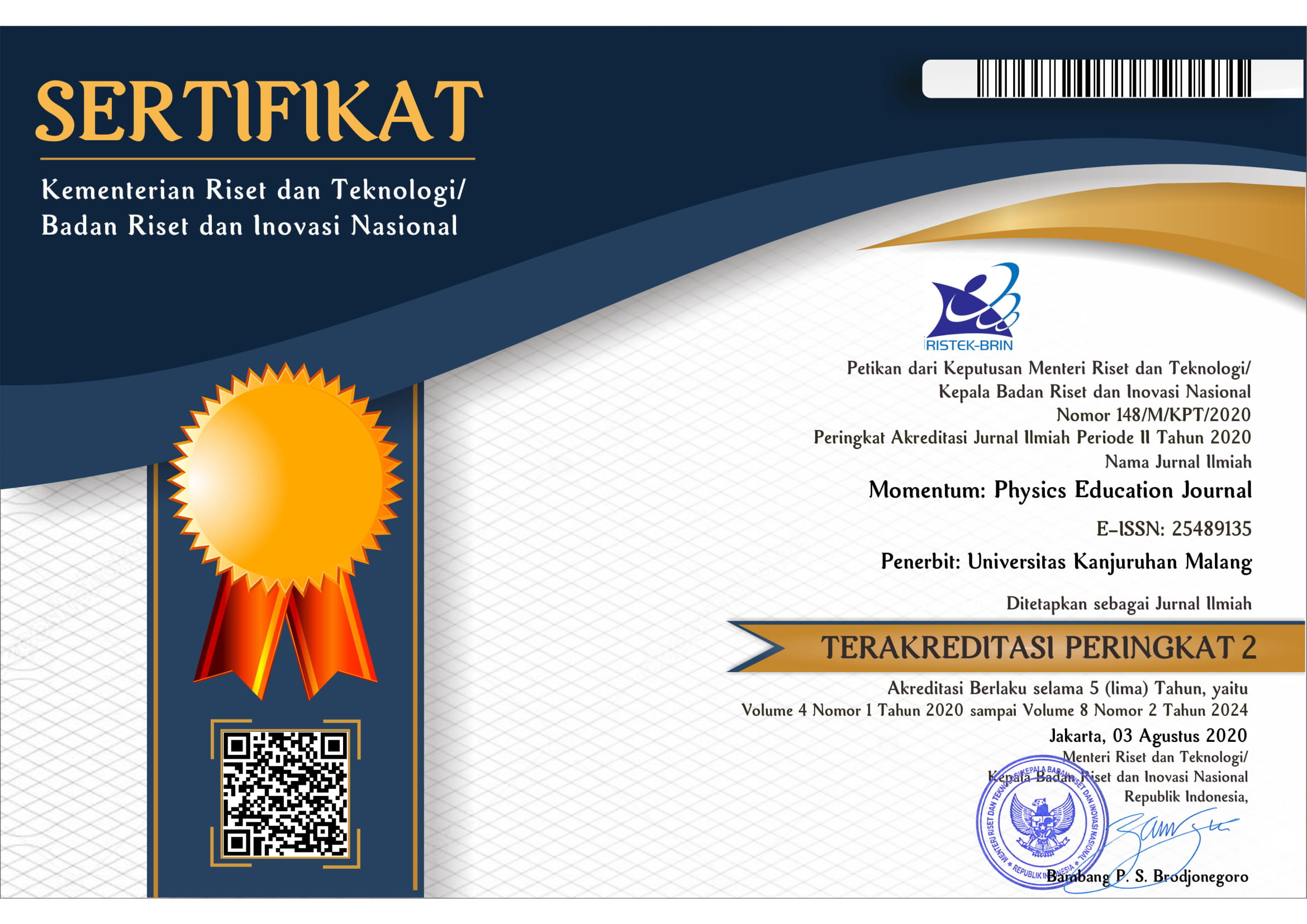Strategi Mind Map dalam Pembelajaran Group Investigation terhadap Keterampilan Proses Sains dan Prestasi Belajar Siswa
DOI:
https://doi.org/10.21067/mpej.v2i1.2370Keywords:
mind map, group investigation, achievement, science process skills, prestasi belajar, keterampilan proses sainsAbstract
Abstract: Physics Learning is a learn that is not only emphasized on the concept as a product, but also need to consider the scientific process in learning. Integrated science process skills and learning achievements are two important learning outcomes in learning Newton's legal concepts. Integrating Mind Map strategy in Group Investigation learning will help students in learning. This study aims to assess empirically the influence of Mind Map strategy in Group Investigation study able to improve the skills of science process and student achievement.This research is an experimental research with pretest posttest control group design. This study used three research samples divided into experiment class 1, experiment 2 class and control class. The determination of the three classes was done by cluster sampling sampling technique from population in SMAN 1 Singosari. Research instruments used in the form of multiple choice test instruments and questionnaires. Analysis of hypotesis using one-way MANOVA. The results of this study obtained 0.000 significance less than 0.05 which means there are differences in the science process skills and student achievement learning with mind mapping strategies in Group Investigation learning, students who learn with Group Invesigation learning and students learning with conventional learning. Abstrak: Pelajaran Fisika merupakan pelajaran yang tidak hanya ditekankan pada konsep sebagai produk, namun perlu juga mempertimbangkan proses ilmiah dalam pembelajaran. Keterampilan proses sains terintegrasi dan prestasi belajar merupakan dua hasil belajar yang penting dalam mempelajari konsep hukum Newton. Memadukan strategi Mind Map dalam pembelajaran Group Investigation akan membantu siswa dalam belajar. Penelitian ini bertujuan untuk mengkaji secara empirik pengaruh strategi Mind Map dalam pembelajaran Group Investigation mampu meningkatkan keterampilan proses sains dan prestasi belajar siswa. Penelitian ini merupakan penelitian eksperimen dengan desain pretest posttest control group. Penelitian ini menggunakan sampel penelitian sebanyak 3 kelas yang terbagi dalam kelas eksperimen 1, kelas eksperimen 2 dan kelas kontrol. Penentuan ketiga kelas dilakukan dengan teknik cluster sampling dari populasi di SMAN 1 Singosari. Instrumen penelitian yang digunakan berupa instrumen tes pilihan ganda dan angket. Analisis uji hipotesis menggunakan uji MANOVA satu jalur. Hasil penelitian ini diperoleh signifikansi 0,000 kurang dari 0,05 yang berarti terdapat perbedaan keterampilan proses sains dan prestasi belajar siswa yang belajar dengan strategi mind map dalam pembelajaran Group Investigation, siswa yang belajar dengan pembelajaran Group Invesigation dan siswa yang belajar dengan pembelajaran konvensional.Downloads
References
Akinbobola, A. O., & Afolabi. (2010). Analysis of Science Process Skill in West African Senior Secondary School Certificate Physics Practical Examinations in Nigeria. American-Eurasian Journal of Scientific Research, 5(4), 234–240.
Aktamis, H., & Ergin, O. (2008). The Effect of Scientific Process Skills Education on Students’ Scientific Creativity. Science Learning and Teaching, 9(1), 1–19.
Amelia, R., Koes, S., & Muhardjito. (2016). The Influence Of V Diagram Procedural Scaffolding In Group Investigation Towards Students With High And Low Prior Knowledge. Jurnal Pendidikan IPA Indonesia, 5(1), 109–115.
Balfaqih, N. M. . (2010). The effectiveness of Student Team Achievement Division (STAD) for Teaching High School Chemistry in the United Arab Emirates. International Journal of Science Education, 25(5), 605–624.
Buzan, T. (2003). Head Strong. Jakarta: Gramedia Pustaka Tama.
fatmawati. (2016). The Analysis Of Students’ Creative Thinking Ability Using Mind Map In Biotechnology Course. Jurnal Pendidikan IPA Indonesia, 5(2), 216–221.
Hilman. (2014). Pengaruh Pembelajaran Inkuiri Terbimbing dengan Mind Map terhadap Keterampilan Proses Sains dan Hasil Belajar IPA. Jurnal Pendidikan Sains, 2(4), 221–229.
Maunah, N., & Wasis. (2014). Pengembangan Two-Tier Test Multiple Choice untuk Menganalisis Kesulitan Belajar Siswa Kelas X pada Materi Suhu dan Kalor. Jurnal Inovasi Pendidikan Fisika, 3(2), 195–200.
Miele, D., & Wigfield, A. (2014). Quantitative and Qualitative Motivation and Critical-Analitic Thinking. Education Psychology Review, 26(1), 519–541.
Mweene. (2012). How Pre Service Teacher’s Understand and Perform Science Process Skill. Eurasia Journal of Mathematics & Technolgy Education, 8(3), 167–176.
Nur, A. C., Haryono, & Masykuri. (2014). Model pembelajaran group investigation (GI) dilengkapi media peta pikiran pada materi pokok kelarutan dan hasil kali kelarutan untuk meningkatkan kerjasama dan prestasi belajar siswa kelas xi ipa sma negeri kebakkramat tahun pelajaran 2012/2013. Jurnal Pendidikan Kimia, 3(2), 1–6.
Rahayu, E., Susanto, H., & Yulianti, D. (2011). Pembelajaran Sains dengan Pendekatan Keterampilan Proses Untuk Meningkatkan Hasil Belajar dan Kemampuan Berpikir Kreatif Siswa. Jurnal Pendidikan Fisika Indonesia, 7(1), 106–110.
Rezba, J. R. (1999). Learning and Assesing: Science Process Skills.
Sherman, L. (1989). A comparative study of cooperative and competitive achievement in two secondary biology classrooms: The group investigation model versus an individually competitive goal structure. Journal Research in Science Teaching, 26(1), 55–64.
Shoimin, A. (2014). 68 Model Pembelajaran Inovatif dalam Kurikulum 2013. Yogyakarta: Ar-Ruzz Media.
Slavin, R. . (2006). Educational Psychology: Theory and Practice 8 Edi. Boston: Pearson.
Zingaro. (2008). Group Investigation: Theory and Practice. Toronto: Ontario Institute for Studies in Education.
Downloads
Published
How to Cite
Issue
Section
License
Copyright (c) 2018 Momentum: Physics Education Journal

This work is licensed under a Creative Commons Attribution-ShareAlike 4.0 International License.


.png)
.png)
.png)
.png)




